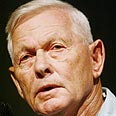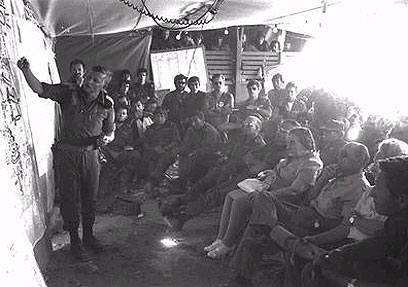
He passed away after suffering a cardiac arrest and is survived by three children, 11 grandchildren and six great grandchildren.
Related stories:
Adan's daughter Neta told Ynet that her father spent the last few years of his life documenting the history of the Palmach at the Palmach Museum in Tel Aviv.

Adan briefing Golda Meir during Yom Kippur War (Photo: GPO)
Adan was born in Kfar Giladi in 1926 as Avraham Eidelson. He joined the Palmach in 1943. During the War of Independence he served as a company commander in the 8th Battalion of the Negev Brigade and participated in Operation Uvda, in which the brigade captured the Jordanian outpost of Umm Rashrash, now known as Eilat, at the southernmost tip of the newly-created country.
It was he who raised the Ink Flag claiming the territory for Israel, as depicted in the famous photograph of the event.
Adan's military career continued after the war. He served in the Armored Corps in 1949 and founded the first Sherman tank unit in the IDF.

Adan with Dayan (Photo: GPO)
During the 1956 Suez War, Adan commanded the 82nd battalion of the 7th Armored Brigade in the Sinai, defeating several Egyptian forces in the region. After the war, he became the operations officer of the corps, then the commander of the 7th Brigade and the Armored Corps School.
During the 1967 Six-Day War, Adan was the deputy commander of the Armored Corps and of the 31st Armored Division, fighting again in the Sinai. On March 10, 1969, he became the commander of the Armored Corps.
He was defending the northern portion of the Israeli defense along the Suez Canal when the Yom Kippur War broke out in October 1973. As the commander of the 162nd Division, his division suffered severe losses from October 6 to October 8, in repeated attempts to stop the Egyptian attack and push it back across the canal.

Raising the Ink Flag (Photo: GPO)
Later on during the war he led his unit across the canal into Egyptian territory just north of the Great Bitter Lake, during Operation Stouthearted Men. He then maneuvered his unit southward to Suez City, where his unit surrounded the Egyptian Third Army.
After the war, a public debate arose over the conduct of each of the generals during the war and the question of who was responsible for the war's failings and successes, but Adan was not personally singled out by the Agranat Committee.
Between 1974 and 1977, he served as the Armed Forces Attaché at the Israeli embassy in Washington, DC.
- Receive Ynetnews updates
directly to your desktop















